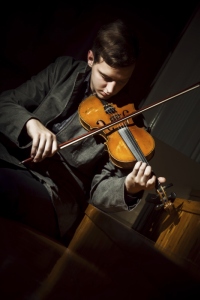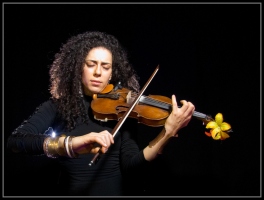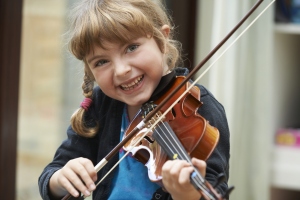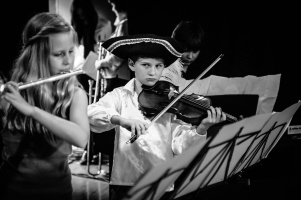
|
Practice or Talent? |
by Mascha Seitz
What makes for a great musician?
This age-old question is the subject of heated discussions, especially among musicians. What makes for a master, practice or talent? And how important are these two respectively for the success of the musician?
 Practice
PracticeThe renowned British music psychologist, Professor John Sloboda, doesn’t believe in talent. He considers talent as a genetic present to be a myth. In his opinion the vast majority of the population has the genetic preconditions to be able to play an instrument well.
However, for the musicality of the individual person are supposedly the first five to six years of childhood the deciding factor. During this time the foundation is created, which makes it important to create for children an environment in which music has a presence. In a survey of 113 persons he found that musicians remember mostly the beautiful and elevating experiences while making music. On the other hand, non-musicians reported overwhelmingly negative emotions, which were accompanied by the feeling of being unmusical.
One of the greatest champion of practicing is the Swedish psychologist K. Anders Ericsson who posited in one of his works for the first time in 1993 the 10’000-hour-rule. This got later popularized by the best-selling «Outlier» by Malcolm Gladwell. Gladwell shows that masters in their profession need 10’000 hours of practice. You should accomplish anything with enough practice.
It’s obvious however that practice doesn’t equal practice. Ericsson, together with some colleagues from the German Max-Planck-Institute, analyzed the kind of practicing and the progress made by music students at the University for the Arts in Berlin. The students dealt with music about 50 to 60 hours per week. What finally made the difference in the results was the intensity of practicing.
 Talent
TalentThere’s a very interesting study by Sibylle Herholz from the German Center for Neurodegenerative Diseases in Bonn; this was published in 2015. In this study several volunteers got the same musical task. All 15 people (who had never before played the piano) got trained for 6 weeks to play melodies by ear. The results varied enormously. While some were able to play the tunes after only two 30-minute sessions, others needed five times as much practice time to reach the same level.
The brains of the volunteers were examined before and after the instructions. It was known from older studies that by practicing new connections are created between the brain areas which are responsible for hearing and the motor control of the fingers. What was new was, that the more talented volunteers showed already before the piano lessons increased activities in the following brain areas: Hippocampus (processing and storing of stimuli); premotor cortex and nucleus caudatus (generating and learning motion patterns).
While Herholz speaks of a ‘predisposition’, the non-scientist, when looking at the test results inevitably will think of the term ‘talent’. The unanswered question is, why these brain areas are more pronounced in some than in others. Possibly doing certain kinds of sports or other acticities can support the learning process at the piano.
In sum, maybe both are correct. With sufficient practice the brain areas get activated, and through talent certain previous activites are supported.
 Passion
PassionAs is often the case, studies get us only a small step closer to the truth. Maybe mental attitude and passion are the things that make success possible.
First of all, it’s motivation that counts. If a child paractices in order to please the parents and only dutifully sits at the instrument, much less ‘sticks’ with this child than with one that develops by itself enthusiasm for music and its instrument and wants to master it. Thus one sees clearly the difference between extrinsic and intrinsic motivation.
One calls it purely intrinsic motivation, when the player plays for the sake of playing. He is absorbed in playing and finds fulfillment in the moment of doing it. Somebody who plays in order to make a great impression, to get an award or is motivated by similar stimuli will get much fewer results tha the one who, full of enthusiasm and dedication forgets time altogether while playing.
The researcher of Happiness, Mihalyi Csikszentmihalyi calls this state 'flow' and explains it thus: «Someone who concentrates (with such intensity) on an activity experiences a paradox: He doesn’t feel anymore like an selfsufficient individual, he becomes one with his task, but his self becomes stronger.»
To practice in (or woth) the flow is thus considerably more efficient than mere practicing. And this might be the difference between a talented and a less convincing musician.

To conclude a quote:
"It really doesn't matter how long. If you practice with your (body), no amount is enough. If you practice with your head, two hours is plenty."
(K. Anders Ericsson)
Source:
http://www.zeit.de/2008/02/P-John-Sloboda
http://www.zeit.de/2015/44/talent-uebung-musik-lernen-forschung
http://www.focus.de/wissen/mensch/begabung-reine-uebungssache_aid_387887.html
http://www.handelszeitung.ch/unternehmen/konzentration-fokus-auf-das-hier-und-jetzt
| Blog overview |
» To the blog list
| Newsletter |
 Do you don't want to miss any news regarding viola anymore? Our newsletter will keep you informed.
Do you don't want to miss any news regarding viola anymore? Our newsletter will keep you informed.» Subscribe to our Newsletter for free
 Visit us on Facebook. The news articles are also posted.
Visit us on Facebook. The news articles are also posted.» To Facebook
| Write us your opinion |
 Was this blog interesting for you? What is your experience with the issue of practicing and talent?
Was this blog interesting for you? What is your experience with the issue of practicing and talent?» To the contact form
Elisabeth Matesky *
*Original pupil out of the 7 Heifetz Violin Master Class USC 1st Int'l pupils; our films on YouTube!
'Pupils ~ There are No Short Cuts!' Quote, Jascha
Heifetz - First day of USC Violin Master Classes!